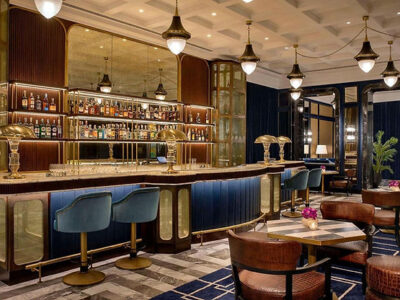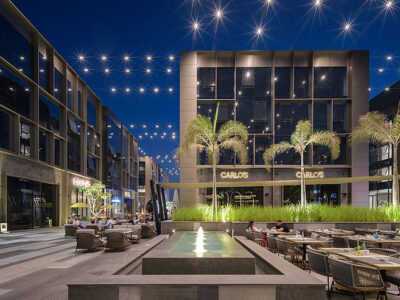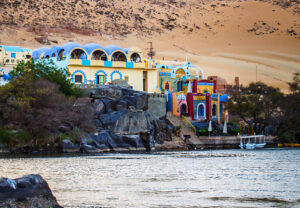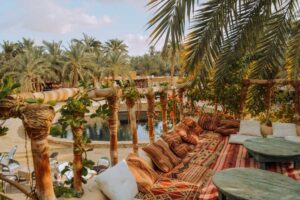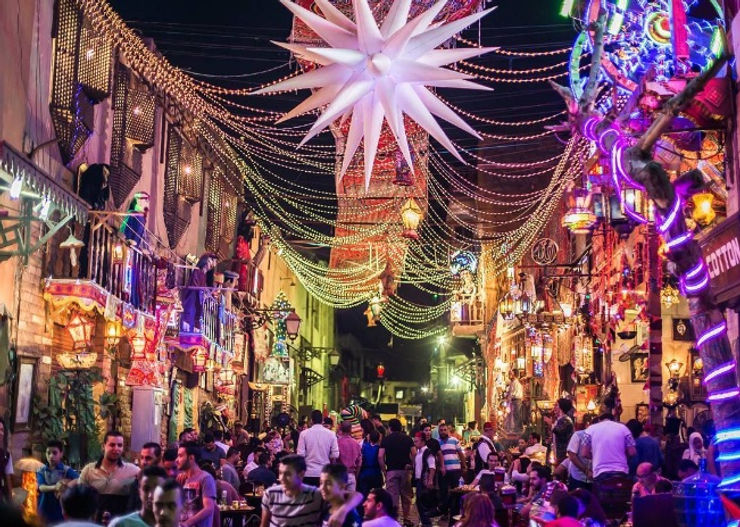
If your upcoming trip to Cairo coincides with the Islamic holy month of Ramadan, you might (scratch that, you probably) feel some sense of hesitation or unease, especially if it’s your first time in a Muslim country. We get it, we do. It’s easy to feel worried about something you might not be familiar with, especially if you want to be respectful at the same time.
Well we’re here to put your worries to rest and give you the real deal when it comes to Ramadan in Cairo. In all honesty, as a tourist, you might not even feel the difference between Ramadan and not Ramadan. But just so you feel prepared, we’ve pulled together some useful info about Ramadan in Cairo that just might come in handy.
Just a quick refresher for those who aren’t quite sure what Ramadan is: it’s a holy month in Islam where Muslims fast (no food, no water, no smoking) from sunrise to sunset. It’s a time of family, community, charity and spirituality. Most Egyptians break their fast at home with a meal of feast-like proportions, usually amongst family and friends. They then digest at leisure (while simultaneously indulging in a ton of delicious but heavy as hell Ramadan desserts, go figure) while watching ‘mosalsalat’, which are month-long soap operas of sorts, with a new episode daily. There’s also a lot of emphasis on giving to the poor and providing food for the less fortunate.
By the way: here’s a list of of Egypt’s ten most beautiful mosques.
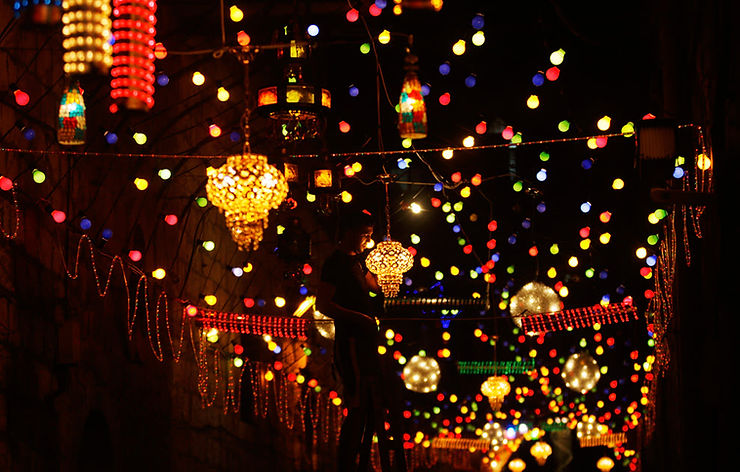
Here’s a few tips for tourists in Cairo (or Egypt as a whole) in Ramadan:
Eating/drinking in public
- As a tourist, no one will look at you twice if you feel like you need to drink something or have a snack while on the go
- Because of the dry heat in Egypt, it’s best if you carry a water bottle around with you. But if you run out, don’t worry, all supermarkets and little street kiosks will be open in Ramadan for you to buy whatever you need.
Eating out at restaurants
- Avoid restaurants at Iftar (breakfast) time, which is around 6:30 pm — they’re overcrowded and the food is not particularly good (the cooks basically whip up a big batch of whatever and hope that the neighborly Ramadan spirit will carry them over the river of poor customer service unscathed).
- Some restaurants pause serving food around 4:30 pm to prep for Iftar because God knows it takes two hours to make large vats of subpar food.
- Basically, up until 4:30 pm you can eat and drink normally at all open restaurants, then avoid them for your own sake until about 8:30 pm.
How to dress
- Clothes-wise, dress normally. As an Egyptian woman, I personally don’t edit my wardrobe for Ramadan and plus Egyptians are in love with tourists so they won’t bat an eye at what you wear regarding Ramadan. If you’re in Cairo and not an Egyptian beach destination, just steer clear of miniskirts, booty shorts, crop tops and you’re good (which is the advice I’d give outside of Ramadan too).
Working hours
- Banks close early during Ramadan (around 1:30 pm). Foreign exchange offices and commercial shops and stores will usually close an hour or two before Iftar, then open again an hour or two after
- Check the Ramadan closing hours for any touristic sites you want to visit (to be on the safe side, plan to start your day early). Most sites like the pyramids might close an hour or so early.
Alcohol
- In Cairo, alcohol won’t be served anywhere except in hotel restaurants/bars to foreigners (just flash them your passport). This also includes the budget hotels/hostels.
- There are always a bunch of foreigners and Egyptians with foreign passports drinking it up, so there’s zero “Islamic guilt” (again, Egyptians are obsessed with tourists and really want them to enjoy themselves).
Traffic
- Rush hour will be around 3-5 pm, so expect even heavier than usual traffic. Working hours are shortened in Ramadan, with most people leaving work during that time.
- The streets of Cairo are AMAZING right before, during and right after Iftar time — the traffic disappears like a bad dream and it takes literally half the normal time it would take you by car to get wherever from wherever. There are also usually tons of cabs and Ubers on the street then, so don’t worry about not finding a ride.
Overall, as a tourist you won’t really *feel* the difference between Ramadan and not-Ramadan, but some funny things to observe are:
- Fasting gives grumpy Egyptians a socially-accepted excuse to shout (even more) at each other on their daily commutes. Men shouting at each other using their voices or car horns (yes that’s a language here) over some car-related stupidity is as normal as seeing kids hop on and off a school bus.
- Fun phrases you’ll probably overhear are the ubiquitous “Allahoma eni sayem” (literal translation: ‘O God I am fasting’, colloquial translation: ‘God give me the patience to not beat this fool’. This phrase is used passive-aggressively several times a day by all fasting men, women and children. Another fun phrase is the idle threat “Matkhalineesh aftar aleik” (literal translation: ‘Do not make me break my fast over you’, colloquial translation: ‘if you don’t stop what you’re doing, I’m going to do something that will cause my fast to be null and void in the eyes of God, and you *don’t* want that’).
- If you happen to be in a car during Iftar time, beware the well-meaning date ninjas. These people stand in the street at Iftar time to pass out free dates for people to break their fast with. This in theory is an act of community and kindness, but in practice these people charge the cars like bats out of hell because YOU MUST GET YOUR DATES, DAMMIT. The good news is that most Egyptian drivers are used to these good date Samaritans throwing themselves randomly in front of cars.
Now some really enjoyable things about Ramadan:
- For fasting Egyptians, the two main meals of the day are Iftar at sunset as previously discussed, then Sohour. Sohour *technically* is what people eat/drink right before sunrise and before the start of their fast, but in Cairo, Sohour starts at 10:30 pm on to sunrise (and then Egyptians lament over not losing weight during Ramadan). So at almost all restaurants and cafes and street vendors across the city, you’ll find happy groups of people (the morning’s grumpiness now a thing of the past) eating, having shisha and playing cards and dominoes all throughout the night.
- Lots of hotels do ‘kheyam Ramadan’, which are Ramadan tents. They serve Sohour food, Ramadan-y drinks, shisha and usually have some kind of live Arabic music, all in a very festive atmosphere.
- Across the city, you’ll find different ‘mawa’ed rahman’, which are tables set up in different neighborhoods daily at Iftar time to provide free food and drinks for the less fortunate.
- Many Egyptians buy a ‘fanoos Ramadan’, a mid-sized lantern that people decorate their homes or places of business with during the holy month. Look out for the fanoos vendors, the fanoos displays are beautiful and a great photo op!
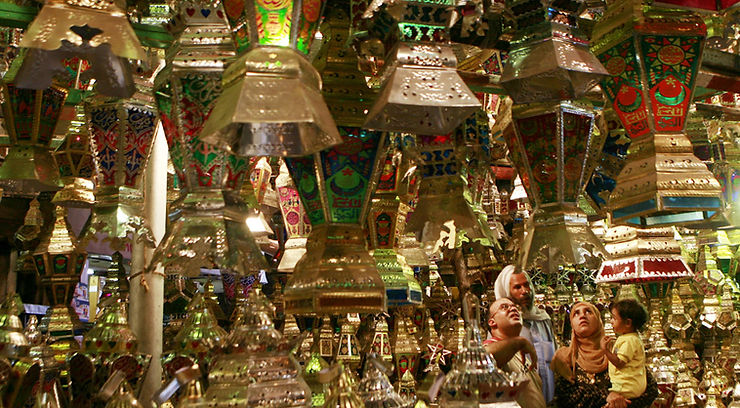
Photo credit: Khaled Desouki/AFP/Getty Images
All in all, Ramadan is a fun and festive time in Cairo, and there’s no need to feel apprehensive. Enjoy the food, Ramadan tents, lanterns and just have a great time.
You might also like: Moez Street in Old Cairo: A Detailed Local’s Guide

